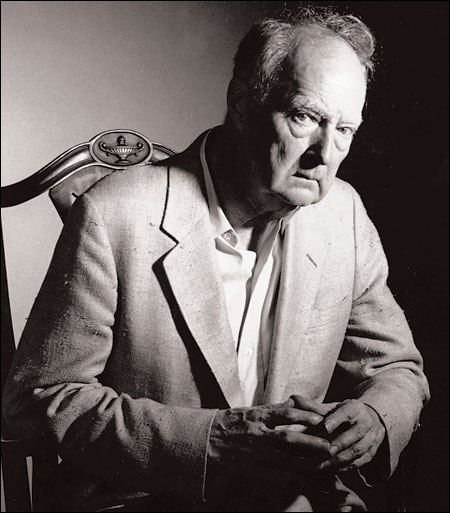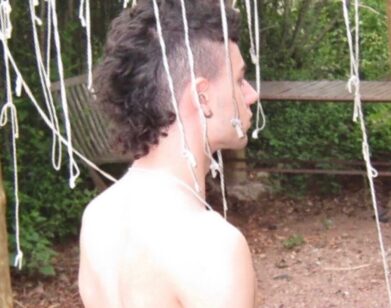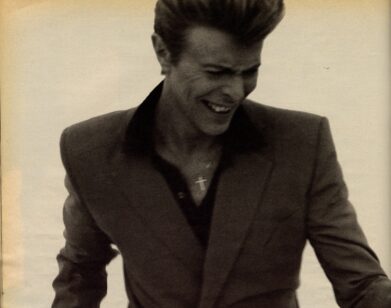James Purdy (1914-2009)

Until March 13, if I’d been asked who was America’s greatest living fiction writer, I likely would have stumped my questioner by answering James Purdy, who certainly would win hands down as America’s most under-rated fiction writer. The day Mr. Purdy passed away, leaving behind him about twenty brilliant novels, several collections of short stories, numerous plays and an enormous output of letters and drawings. Although he was greatly admired by the likes of Edith Sitwell, Edward Albee and Gore Vidal, Purdy spent most of his career as a best-kept secret. I love Purdy’s work, and was lucky enough to know him—a unique artist and a man wonderfully though problematically out of step with his times. What follows is an excerpt from an extremely rare interview with the delightfully cantankerous author, conducted by the late Stephen Varble, which was published in Interview in December 1972 on the occasion of his comic novel I Am Elijah Thrush, which was apparently inspired rather loosely by the life of Paul Swan (1883-1972, aka “the most beautiful man in the world,” and arguably the father of modern dance.)
STEPHEN VARBLE: You’re very famous.
JAMES PURDY: No, not really, except for the New York establishment which isn’t really a literary establishment. It’s just a collection of broken down old newspaper hacks who pass judgment on books that they have not even read, with assuredness of Jehova. The worst of them, of course, is The New York Times, the worst newspaper in the world and extremely vicious to artists.
SV: I don’t think they realize the amount of sacrifice involved in any kind of creativity.
JP: Oh, they realize nothing. Most journalists are broken down alcoholics, you know. Publishers, too, seem to be in an alcoholic haze most of the time. Well, the publishers have no idea what a writer is. None whatsoever! The public is totally illiterate in America. It can’t read at all. It’s absolutely insensitive to words. And to vision. Feeling is taboo, also, especially in New York. I read in some little magazine the other day that The New Yorker and The New York Times were sclerotic, meaning you know, “completely turned to rock.” The critics here are that way. They have no heart or mind. They’re automatons. They are frightened to death of any writing like mine which begins deeply inside and comes from within. They only want the outside. They think that is reality. The outside. Their writing is all about what you see when you look out a window. It’s reality. If you count numbers, and then, according to them, you should be so interested in the social conditions. Well, they don’t know anything about the human being, let alone social conditions. You see my books are really all underground in that they are about something people don’t want to hear expressed. And though the critics would like to carry them off to the shit-yard, they can’t seem to get rid of them, because they haunt people. Even someone who’s read only one story—they never forget that story. I’ve had people say, “Well, that’s the only story by you I’ve ever read. I’m not strong enough to read any more, but I will never forget it. Well, they may read these other best sellers, too, but they can’t even remember their names.
SV: Wasn’t Malcolm a best seller?
JP: No. Never. None of my books are best-sellers. The paperback version of Malcolm goes on selling, partly because Edward Albee put it on the stage. In fact, the only thing that’s kept me alive is the books that are in paperback. People find them, they like them, and they pass them on.
SV: Have any of your things been made into movies?
JP: No. M.G.M. bought one, but they never made it.
SV: Which one?
JP: Cabot Wright Begins. It’s about publishing and a rapist, actually. They got it for a nickel. But it looked big to me at the time.
SV: A few thousand?
JP: Yes. As always, I wonder if I’ll get through the winter. Then when winter is over, I wonder about the summer. But that’s because the system decided which author shall be commercially successful. As I said, the most vicious of them all is The New York Times, because it pretends to be literary and impartial, and it’s really this opinionated, myopic, stupid giant of incompetence. And then, a place like S. Klein on the Square is in charge of deciding which books will sell. And, by God, that’s shoved right up the ass of the American public. If they don’t like it, they just stick it up higher. Then the book prizes, National, what is it, uh, National Best-Seller Award. These prizes go to little writers that have flattered the system—you know, and kissed the hind-ends of big publishers. It’s all just a cheap racket. Almost everything official in America is a huge fraud.
SV: Is there any other period of history in which you would have preferred to live?
JP: I’ve never felt part of any place or time. I just am, I guess. I write about what I know—little small towns.
SV: What were your first experiences of television like?
JP: Well, you know, I was teaching school in Wisconsin when television came into its own, and I was so poor then that I didn’t have a set, and so I never really saw television.
SV: But, do you remember the first time you ever saw a television?
JP: Yes, I do. I went to Chicago to visit some friends, and it was snowing, and I thought, “What is that strange light?” It was quite late at night. And in this store window was a television set going. And you heard no sound, and there was no one on the street, and there was the snow falling and this strange phantasmagoria of visions. I felt everyone was dead except this machine, and that it would go on forever, and no one would look at it. Except the snowflakes, perhaps.
SV: Some people say that television is the westerner’s answer to eastern mysticism.
JP: No.
SV: You don’t think so?
JP: No one looks at a television, and no one hears it. It’s a poison. Television masturbates its audience even though the audience is not really watching. It masturbates orifices the audience doesn’t have. It sticks holes in the viewer and masturbates in those holes. Then it finally gets into the brain and masturbates there, too. This will finally end in the whole culture having softening of the brain. So I don’t think it’s like eastern mysticism, which leaves the person whole. It’s really another form of cancer, television.
SV: But, do you see television as just another aspect of its cultural decline?
JP: I think it’s an aspect of the end of America. I think America, really, is over. We’re living in the…
SV: Yes, but, if you were given the opportunity to program it, how would you program it?
JP: Well, I’d get rid of it.
SV: You wouldn’t allow it?
JP: I think you could perhaps ridicule it out of existence, perhaps.
SV: Don’t you think it could be helpful and instructive if each person could tape himself and watch himself as he grew?
JP: Oh, I think it would be terrible. I don’t like it because it’s a machine. I am against all machines. It’s no wonder that so many Americans go on dope when they have no other cultural stimulus than a television.
SV: Which programs them to be insatiable.
JP: Yes, that’s the great cancerous horror of America, that one is made to expect everything and give nothing. They’re this giant, cancerous consumer. And the more they eat, the more cancerous they become. We are also experiencing a decline of manners. There are no manners left in America at all, because all you’re doing is kicking the person next to you so that you can consume more, see more, and get more.
SV: Have you felt the population explosion?
JP: Yes, that, of course, is behind everything.
SV: But do you think television is making everyone to want…?
JP: More babies? Yes, more babies. Actually, television tells you to take dope, too. It tells you to destroy the human race really, by first having more consumers and then consuming more poison and then making the whole planet uninhabitable.
SV: And common products like bread, what do you think of the quality of common consumer products?
JP: Well, we know now that bread is a poison. It’s not food. It’s a poison. I wish people would call poisons poison. I don’t mind people smoking marijuana, but they should admit it’s a poison, and coffee’s a poison, but, you see, the Americans lie so. And Margaret Meade always running around saying that marijuana’s just like bread and water! Well, bread and water are poison, and marijuana’s a poison. Now, if you like poison, why shouldn’t you have it? But don’t try to pretend that it’s innocuous.
SV: Well, the metaphysical poets used to say that every breath that one breathed brought one closer to death.
JP: Yes. But they fact that they created meant that they believed in life.
SV: They believed in something positive about it. Perhaps, then, your own writing is primarily about grief.
JP: Yes. Yes, it is. But, you see, no one likes to hear about grief anymore. One of the apostles of the anesthetic way of life, Susan Sontag, said of The Nephew, “It is dangerously close to sentimentality,” meaning that like most New York critics, she could not enter into this American experience. But actually what she was saying was that any book which demanded an emotional response from her was taboo. “I will not feel.” That’s the Susan Sontag syndrome. “I will not feel. I don’t want to feel, because that’s sentimental.” There’s really nothing wrong with sentimentality. But the book is not sentimental. Because nothing I wrote is sentimental. Mind you, I don’t dislike her or like her. I just am pointing out that her comments about my work are completely irrelevant, because she doesn’t have the soul and background to enter into my world. She’s irrelevant and typical of the period.
SV: What do you think of egomania?
JP: Well, if you’re a writer, you have to be an egomaniac. You have to just believe in yourself, which is hard work. Because the world is telling you through The New York Times and The New York Review of Books “You must shut up. You must never appear again. Because you are not relevant to us.” So you have to fight their attempt to destroy you, fight to continue feeling. But, that’s the literary world of America today.
SV: Is that your journal on the table?
JP: Yes. That’s were I wrote Elijah Thrush. It’s all in here. See? That’s how it began.
SV: Oh, how funny. Do you write in pencil?
JP: Unh-huh. Or in pen.
SV: Don’t you find that pencil tires you?
JP: Yeah. But so does typing.
SV: I could never type a first draft. Do you type the first draft?
JP: Well, I have. I took typing in high school.
SV: You can think and still type?
JP: Yes, but I wrote most of Elijah Thrush in this notebook—because it seemed so like a letter. It’s such a personal book.
SV: Your handwriting somehow frightens me—somehow makes me think that you have been in transit most of your life.
JP: Yes. I don’t have any home. This room is all that’s left. Everyone I grew up with, my family, are all dead. So I feel kind of like a ghost. I’m more interested in the past. And a kind of communing with unseen things which is your art, really. Then there’s the world of the newspapers. They believe that what is happening is happening, which is so naïve. Because they’re the first to turn on that. And they say, “No, that’s no longer pertinent.” The very thing they foster is thrown out by them. They do that with the writers. The writers they praise one year are never mentioned the next. Well, I’ve never been in fashion. Not at all.
SV: What do you think about fame?
JP: I think fame is something that you’ve achieved in your inner self that becomes known to others outside you. There are really very few famous people in history.
SV: So you don’t think of any of our popular figures as really famous?
JP: No, not really. To reach those, one must turn entirely to the dead, the dead that are alive in our minds.
SV: So the world of the rock singer who attempts to become the spiritual mover of today is an irrelevant consideration to you.
JP: Yes. I like jazz much better.
SV: And none of the rock suicides have touched you?
JP: They just mean nothing to me.
SV: And Marilyn Monroe’s suicide meant nothing to you?
JP: No.
SV: Which is the last suicide that meant anything to you?
JP: Jesus, I guess.






